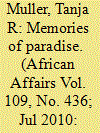| Srl | Item |
| 1 |
ID:
121771


|
|
|
|
|
| Publication |
2013.
|
| Summary/Abstract |
This paper traces the emergence of Band Aid celebrity humanitarianism and its ongoing legacy, making use of Tester's concept of 'common-sense humanitarianism' and Fassin's reasoning on 'humanitarian governance'. Using different examples of celebrity engagement during the 1983-85 famine in Ethiopia and the 2011 famine in Somalia, it argues that the, in essence, anti-political understanding of disaster propagated by celebrity humanitarians not only masks the underlying dynamics of power and of social and economic relations that underpin every famine, but at the same time manufactures a truth about 'Africa' and other places perceived as destitute. In doing so celebrity humanitarianism more generally legitimises a global hegemonic system characterised by increasing inequalities.
|
|
|
|
|
|
|
|
|
|
|
|
|
|
|
|
| 2 |
ID:
098088


|
|
|
|
|
| Publication |
2010.
|
| Summary/Abstract |
During the Cold War, state-led education exchange programmes between post-colonial states and the former German Democratic Republic (GDR) were common. The biggest such project, the School of Friendship (SdF), sent 899 Mozambican children for socialist-inspired schooling in the GDR. By the time they returned to Mozambique in 1988, the transition from socialist-revolutionary state to capitalist society was under way. This article discusses the legacies of socialist education, focusing on the lives of some of those who spent the decisive years of adolescence in the GDR. The narratives give insights into the contradictory social reality of this historical period, showing how the SdF equipped the participants with 'modern' virtues that became vital for their future lives, but which had also become largely obsolete by the time they returned to Mozambique. The SdF could thus be judged as a highly politicized programme where children were treated as pawns in a wider political game, while at the same time new horizons opened for its participants.
|
|
|
|
|
|
|
|
|
|
|
|
|
|
|
|